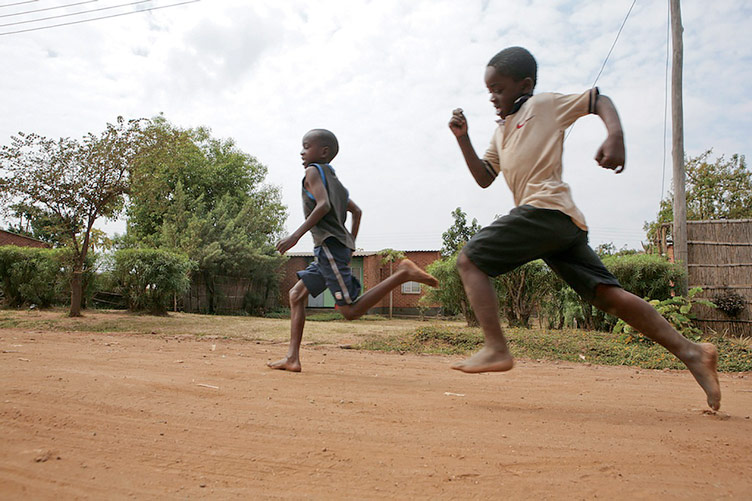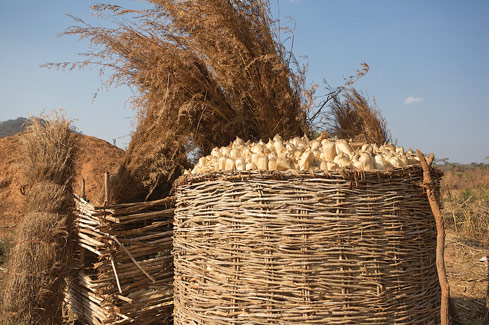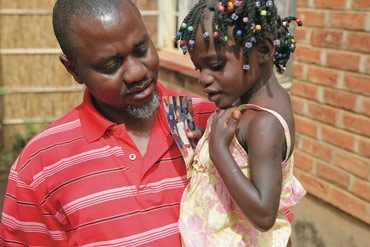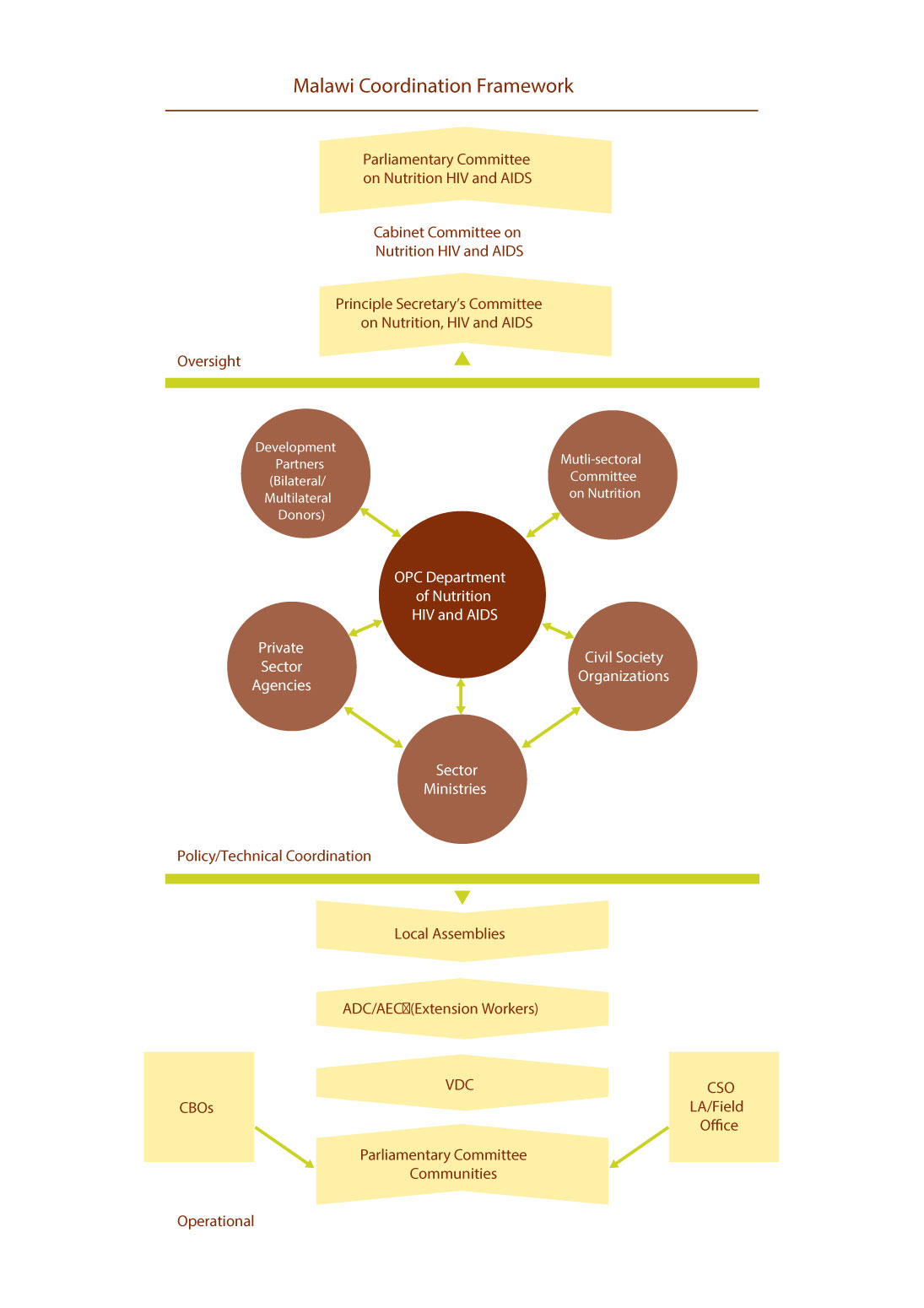Aligning for Positive Change
Determined to take action against the high rates of malnutrition and HIV and in recognition of the strong relationship between nutrition, HIV and AIDS, the Government of Malawi established the Department of Nutrition, HIV and AIDS (DNHA) in the Office of the President and Cabinet (OPC) in August 2004.
[vc_row row_type=”row” text_align=”left” css_animation=””][vc_column width=”1/2″]

Malawi has established a coordinating framework linking nutrition with HIV and AIDs.
Edith Mkawa, Secretary for Nutrition, HIV and AIDS describes the system and its achievements…[/vc_column_text][/vc_column][/vc_row][vc_row row_type=”row” text_align=”left” css_animation=””][vc_column][vc_separator type=”transparent”][/vc_column][/vc_row][vc_row row_type=”row” text_align=”left” css_animation=””][vc_column]
[vc_column_text custom_options=””]“Nearly half the children in Malawi are affected by stunting. This figure has not changed significantly over the last three decades. This is alarming, disturbing and not acceptable. It is for this reason that I personally took up the responsibility of being the minister of nutrition in order to provide the highest political leadership and support to accelerate efforts to combat malnutrition and its consequences.”
Joyce Banda
President
[/vc_column_text][/vc_column][/vc_row][vc_row row_type=”row” text_align=”left” css_animation=””][vc_column][vc_separator type=”transparent”][/vc_column][/vc_row][vc_row row_type=”row” text_align=”left” css_animation=””][vc_column][vc_column_text custom_options=””]Determined to take action against the high rates of malnutrition and HIV and in recognition of the strong relationship between nutrition, HIV and AIDS, the Government of Malawi established the Department of Nutrition, HIV and AIDS (DNHA) in the Office of the President and Cabinet (OPC) in August 2004. [/vc_column_text][/vc_column][/vc_row][vc_row row_type=”row” text_align=”left” css_animation=””][vc_column][vc_separator type=”transparent”][/vc_column][/vc_row][vc_row row_type=”row” text_align=”left” css_animation=””][vc_column][vc_column_text custom_options=””]Her Excellency the President Dr Joyce Banda is the Minister responsible for Nutrition, HIV and AIDS while the Principal Secretary is the head of the DNHA and also the Focal Point for the SUN Movement in Malawi. By positioning the DNHA in the OPC, nutrition was given the highest level of political support. The DNHA holds the mandate for overall policy direction, oversight and supervision of nutrition. As a result of this political endorsement, nutrition gets considerable attention at national and district level.
There are multiple levels and platforms for coordinating stakeholders involved in nutrition in Malawi. At the highest level, there are three political committees that provide oversight for nutrition, HIV and AIDS at cabinet, parliamentary and principal secretary levels. [/vc_column_text][/vc_column][/vc_row][vc_row row_type=”row” text_align=”left” css_animation=””][vc_column][vc_separator type=”transparent”][/vc_column][/vc_row][vc_row row_type=”row” text_align=”left” css_animation=””][vc_column][vc_column_text custom_options=””]
National multi-stakeholder platforms for nutrition
Two similar multi-sectoral and multi-stakeholder platforms (MSPs) have been set up to coordinate nutrition plans and actions. Both are composed of a cross section of stakeholders including representatives of key sectoral ministries, development partners, civil society organizations, academics, private sector and other institutions implementing nutrition.
The National Nutrition Committee (NNC) chaired by the Permanent Secretary in DNHA and co-chaired by UNICEF provides technical oversight and guidance on implementation and operationalization of the National Nutrition Policy and Strategic Plan within sectors. Under the NNC, there are seven technical working groups (TWGs). The TWGs meet and report to the NNC on a quarterly basis. The chair for the NNC provide updates to the three government committees on nutrition.
The seven technical working groups involve a wide range of agencies. These groups report to the NNC and are responsible for;
- Targeted Nutrition Programme chaired by the Ministry of Health and co-chaired by WFP
- Micronutrients chaired by the Ministry of Agriculture and co-chaired by UNICEF
- Infant and Young Child Feeding chaired by the DNHA and co-chaired by USAID
- Integrated Nutrition and Food Security Surveillance chaired by the DNHA and co-chaired by WFP
- Nutrition Education, Training and Research chaired by Lilongwe University of Agriculture and Natural Resources and co-chaired by DNHA
- Nutrition Care Treatment and Support chaired by DNHA and co-chaired by the Ministry of Health
- School Health and Nutrition chaired by the Ministry of Education and co-chaired by GIZ (German International Cooperation).
[/vc_column_text][/vc_column][/vc_row][vc_row row_type=”row” text_align=”left” css_animation=””][vc_column][vc_separator type=”transparent”][/vc_column][/vc_row][vc_row row_type=”row” text_align=”left” css_animation=””][vc_column][vc_column_text custom_options=””]The Technical Working Groups provide technical assistance, monitoring and implementation on nutrition activities according to their mandate.
A SUN Movement Task Force was established soon after Malawi became a participant in the SUN Movement, the taskforce was mandated to facilitate the scaling up of nutrition and strengthen multi-stakeholder platforms. The task force specifically supports the operationalization of the National Nutrition Education and Communication Strategy (NECS) which is the backbone for scaling up nutrition at all levels. The taskforce is composed of technical officers from government, donors, civil society and other groups.
Malawi held a SUN Movement launch in July 2011 under the theme ‘Unite to End Stunting’. This strengthened the political visibility of nutrition and mobilized resources.[/vc_column_text][/vc_column][/vc_row][vc_row row_type=”row” text_align=”left” css_animation=””][vc_column][vc_separator type=”transparent”][/vc_column][/vc_row][vc_row row_type=”row” text_align=”left” css_animation=””][vc_column]
Composition of national SUN Task Force
- DNHA (Chair);
- Nine line ministries including health, agriculture, education, gender, local government and civic education each with designated officers who are responsible for nutrition and who report to the Task Force;
- UN agencies including United Nations Children’s Fund (UNICEF), World Food Programme (WFP), World Health Organization (WHO) and Food and Agriculture Organization (FAO);
- Donors including technical experts from IrishAid, United States Agency for International Development (USAID), UK Department for International Development (DFID), the European Union and the GIZ.
- Civil society including representatives from the SUN civil society alliance.
- Business community including VALID International; Rab Processors Limited; Consumer association; and Illovo Sugar Company and Consumer Association of Malawi.
- Academia including the University of Malawi; and Lilongwe University of Agriculture and Natural Resources
 [/vc_column_text][/vc_column][/vc_row][vc_row row_type=”row” text_align=”left” css_animation=””][vc_column][vc_separator type=”transparent”][/vc_column][/vc_row][vc_row row_type=”row” text_align=”left” css_animation=””][vc_column][vc_column_text custom_options=””]
[/vc_column_text][/vc_column][/vc_row][vc_row row_type=”row” text_align=”left” css_animation=””][vc_column][vc_separator type=”transparent”][/vc_column][/vc_row][vc_row row_type=”row” text_align=”left” css_animation=””][vc_column][vc_column_text custom_options=””]
Independent stakeholder platforms for nutrition
There are several independent stakeholder platforms for nutrition
The Government-Development Partners Nutrition Committee (Multi-lateral and Bilateral) is a high level committee convened by the Principal Secretary for Nutrition, HIV and AIDS with heads of development partners on a quarterly basis. The objective is to promote and identify funding resources for nutrition and promote joint resource mobilization. The Principal Secretary reports key outcomes of the NNC to this committee.
The Donor Nutrition Security group, popularly known as the DoNuts brings together technical nutrition experts from the donors, UN agencies and a representative from the civil society alliance. The group meets monthly and provides support to the government for its scaling up nutrition efforts. The DoNuts also discuss opportunities for joint cooperation and co-funding between development partners in nutrition, and present a coherent voice on policy. The DoNuts link with donors in other sectors to highlight the importance of nutrition participants from DNHA participate in DONUTS as required.
The SUN Civil Society Alliance is composed of over 20 organisations from farmer organizations, education, social protection, community-based organizations, livelihoods orientated non-governmental organisations, academia and other alliances and networks.
The Alliance is convened and chaired by Concern Worldwide with the Clinton Health Access Initiative (CHAI) and meets every two months. It receives funding through the SUN Movement Multi-Partner Trust Fund6 and has a full-time coordinator. The Alliance builds consensus on nutrition policy and actions with the DNHA, encourages sharing of best practices and lessons learnt, and the alliance also advocates for mobilization of funding for nutrition and has started to map nutrition actors and programmes at district level and to identify nutrition champions.
The United Nations has a five year strategic plan, namely the United Nations Development Assistance Framework (UNDAF 2012 – 2016) and an implementation plan for the UNDAF. The UNDAF has five priority areas namely;
- sustainable economic development and food security
- social protection and disaster reduction
- social development
- HIV and AIDS
- good governance.
These priorities reflect areas where the UN has a comparative advantage in supporting national ownership, coordination and alignment of assistance behind the Malawi Growth and Development Strategy. The implementation of the UNDAF is coordinated and monitored by the UNDAF Joint Steering Committee and supported by Cluster Leaders who coordinate development responses in the five priority areas above. The nutrition component of the implementation plan is coordinated through the UN Nutrition Coordination Group that reports to the UNDAF Cluster Lead for priority two mentioned above. UNICEF is the lead of the UN Nutrition Coordination Group, which also includes WFP, FAO, and WHO. The group coordinates SUN activities supported by UN partners.
The business community has a platform through the Malawi Chamber of Commerce and the National Fortification Alliance (NFA). The NFA is responsible for ensuring fortification standards for centrally processed foods such as sugar, wheat and maize flour, salt etc. VALID International, a company managing the local production of Ready-to-Use.[/vc_column_text][/vc_column][/vc_row][vc_row row_type=”row” text_align=”left” css_animation=””][vc_column][vc_separator type=”transparent”][/vc_column][/vc_row][vc_row row_type=”row” text_align=”left” css_animation=””][vc_column]
Role of the District SUN Movement Task Force
- Establish district multi-sectoral platforms
- Conduct orientations for staff
- Assess the nutrition situation using a standard tool
- Conduct district SUN Movement planning
- Launch SUN to create awareness
- Train district teams
- Convene meetings to share lessons and track implementation
- Identify and train Community Leaders for Action in Nutrition (CLAN)
- Mobilise community
- Support community growth monitoring
- Support community activities around the 1000 days period (theme based discussions, seasonality calendar, cooking demonstrations, infant and young child feeding counseling, dietary diversity, immunization, WASH activities, micronutrients, maternal nutrition etc.)
- Conduct communication activities (community radio, theatre groups)
- Monitor and review
Government, business and development partners work together to reduce vitamin A deficiency
 [/vc_column_text][/vc_column][/vc_row][vc_row row_type=”row” text_align=”left” css_animation=””][vc_column][vc_separator type=”transparent”][/vc_column][/vc_row][vc_row row_type=”row” text_align=”left” css_animation=””][vc_column][vc_column_text custom_options=””]
[/vc_column_text][/vc_column][/vc_row][vc_row row_type=”row” text_align=”left” css_animation=””][vc_column][vc_separator type=”transparent”][/vc_column][/vc_row][vc_row row_type=”row” text_align=”left” css_animation=””][vc_column][vc_column_text custom_options=””]
Multi-stakeholders working in districts and communities
District commissioners are in charge of all activities implemented at district level including nutrition with support from the District Executive Committee.
District level coordination of nutrition issues is done through the District Nutrition Coordination Committee (DNCC), which has representatives from key sector departments, civil society and the private sector.
Like all the other technical committees at the district level, the DNCC is a sub-committee of the District Executive Committee in the Local Assembly (LA) and provides technical advice to the LA, in addition to coordinating district-wide nutrition issues. The DNCC is also responsible for supporting the roll out the NECS. There are plans to strengthen the nutrition MSPs at local and community level through Area and Village Development Committees.[/vc_column_text][/vc_column][/vc_row][vc_row row_type=”row” text_align=”left” css_animation=””][vc_column][vc_separator type=”transparent”][/vc_column][/vc_row][vc_row row_type=”row” text_align=”left” css_animation=””][vc_column][vc_column_text custom_options=””]
Achievements
The role played by MSPs in bringing together the skills, expertise and resources of different sectors and groups, complemented by the leadership of President Banda has resulted in significantly greater attention and commitment to nutrition in Malawi.
The MSPs act as fora for sectors and stakeholders to come together for mutual support and to share their experiences in the implementation of nutrition interventions. They have boosted efforts to coordinate implementation of nutrition interventions. In addition President Banda has put in place a presidential committee to champion nutrition, composed of eight influential traditional leaders and three technical experts, whose objective is to mobilise and sensitize traditional leaders about nutrition.
The Government of Malawi has pledged to increase resources for nutrition across multiple sectors. There are already budget lines for nutrition in some sectors and the government has pledged to increase resources for nutrition. The government has also committed to strengthen public private partnerships on nutrition, building on successful examples such as the work with Illovo on sugar fortification with Vitamin A.
Because of the high-level political commitment and clear strategy for reducing stunting, the government has been able to leverage resources from multiple donors. This was coordinated through the Government – Development Partners Committee. Current support is from the following partners: Government of Malawi, World Bank-CIDA pooled funding. Additional support is from USAID, DFID, EU, Irish Aid, UNICEF, FAO and WFP, who together support all districts.
Nutrition has now been given priority at district level where nutrition has been included in the district implementation plans. Some districts have been able to conduct joint planning and supervision and have pooled resources. All districts have district implementation plans though the allocation of resources for nutrition is not adequate.
A key triumph in nutrition in Malawi has been the roll out of the NECS through the MSPs with a range of achievements from capacity building at national level to community implementation. A one-day SUN Learning Forum was convened by the DNHA in August 2013 which reviewed progress of the NECS in seven districts (Nkhatabay, Neno, Ntchisi, Mzimba, Kasungu, Dedza and Balaka). Significant progress was reported by districts in mobilizing for action and sensitizing stakeholders to the issue of nutrition. Rapid assessments of the nutrition situation have been carried out in some districts and bottle necks have been identified at sub-district level which has resulted in more accurate planning for scaling up nutrition activities. Traditional community based structures such as chiefs and volunteers have been instrumental in community sensitization and mobilization of communities around nutrition.[/vc_column_text][/vc_column][/vc_row][vc_row row_type=”row” text_align=”left” css_animation=””][vc_column][vc_separator type=”transparent”][/vc_column][/vc_row][vc_row row_type=”row” text_align=”left” css_animation=””][vc_column][vc_column_text custom_options=””]
Challenges
There are challenges, however.
- inadequate financial and human capacity at district and community level.
- nutrition-sensitive strategies are not yet in place within some sectors particularly the ministries of: local governments, agriculture and gender.
- stakeholder mapping – which identifies partners, their main activities and resources – is incomplete yet critical for avoiding duplication.
- MSPs have been set up at national and district level but have yet to be institutionalized at local and sub- district level.
[/vc_column_text][/vc_column][/vc_row][vc_row row_type=”row” text_align=”left” css_animation=””][vc_column][vc_separator type=”transparent”][/vc_column][/vc_row][vc_row row_type=”row” text_align=”left” css_animation=””][vc_column width=”1/2″][vc_column_text custom_options=””] [/vc_column_text][/vc_column][vc_column width=”1/2″]
[/vc_column_text][/vc_column][vc_column width=”1/2″]
Key Lessons
- High level coordination helps to enhance political will and commitment to nutrition at national level.
- Coordination has helped to target and mobilize resources from development partners.
- Decentralized coordination structures are crucial to empower communities so that they can play a role in implementing sustainable programmes.
- Strengthening district and community level coordination structures requires effort
- Acting together is critical to ensure scaling up of interventions at all levels.
